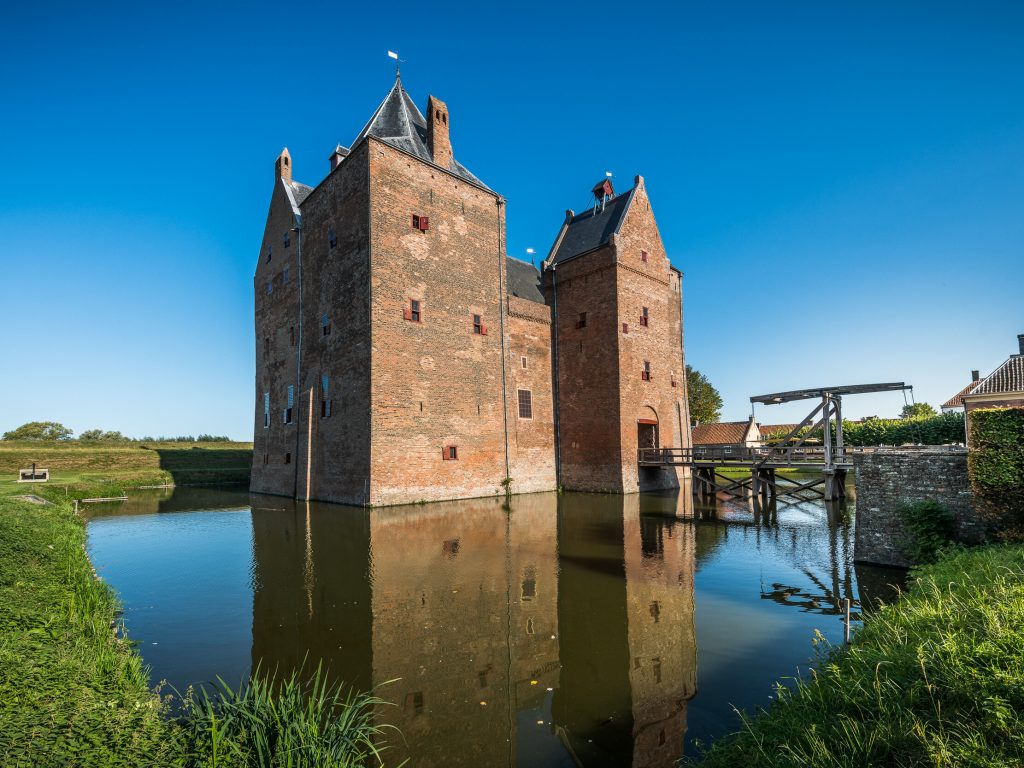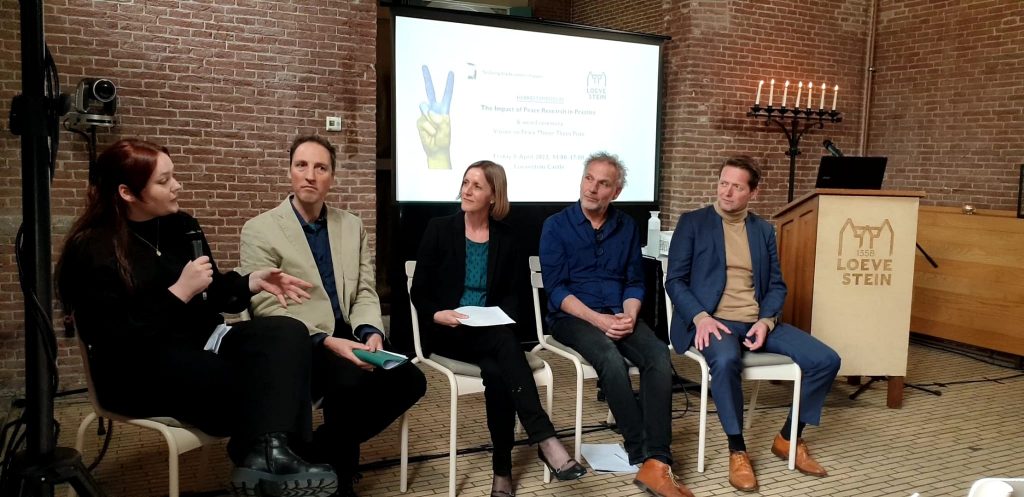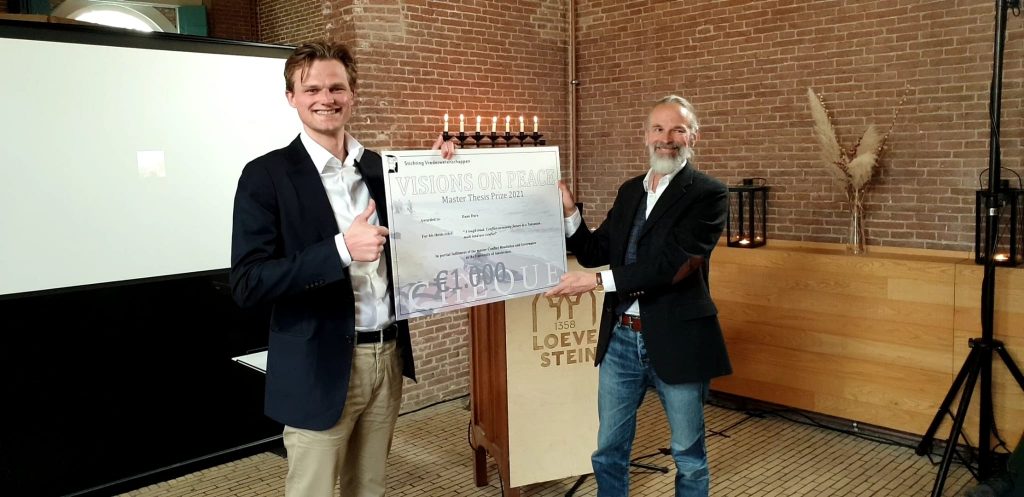On Friday 8 April 2022 the Dutch Foundation for Peace Studies awarded the 2021 Visions on Peace Master Thesis Prize to Daan Dura, who wrote his thesis titled “A tough triad: Conflict-sustaining factors in a Tanzanian multi land-use conflict” in partial fulfilment of his master Conflict Resolution and Governance at the University of Amsterdam. The price was awarded during the annual symposium of the Dutch Foundation for Peace Studies. This year, the symposium was organized in collaboration with Loevestein Castle, and focused on the theme of peace research and its impact on practice.
The role and impact of peace and conflict studies
With the war in Ukraine raging on, the question of What is the role and impact peace and conflict studies could not be more timely. A panel consisting of Ed Dumrese (director of Loevestein Castle), Mathijs van Leeuwen (professor of Peace and Conflict Studies at the Centre for International Conflict Analysis and Management at Radboud University), Kees van den Broek (CARE Netherlands) and Nour Gjaltema (lecturer in peace and conflict studies at the Vrije Universiteit Amsterdam) explored this question in, somewhat ironically, the armoury of Loevestein Castle.

The panel, excellently facilitated by independent peacebuilding consultant Jeannine Suurmond, delved into the age-old question of exchange between academic research and practice. The commonly held perception is that academic research should feed directly into policy and practice, but what does that look like in reality? Academic work may be too abstract for it to be translated into workable recommendations for organizations working in particular contexts and on specific issues. Moreover, few organizations working on peacebuilding will have the time for reflecting on the implications of academic research for their projects and programmes, that is, if they can access academic work. Although this is changing slowly, much of academic research remains behind institutional paywalls.
Scholars of peace and conflict studies see similar challenges around translating their work to recommendations for policy and practice. They worry about the uncritical uptake of theoretical concepts and ideas, with all their layers and nuances, such as ‘legitimacy’ and ‘inclusion’. There needs to be much more dialogue between academics and practitioners on how research findings can be applied in the field, but like practitioners, academics are under time pressure. Current relations between research institutes and implementing organizations are often instrumental; partnerships are a common requirement in order to obtain funding. Instead, we need structural exchange, through which research findings can directly feed into intervention and training programmes.

Visions on Peace Master Thesis Prize 2022
It might be promising that students of peace and conflict studies at Dutch universities are commonly called to think about the implication of their findings for policy and practice. In her study on ex-combatants of the FARC-EP, Izzy van Unen (Utrecht University), one of the nominees for the Visions on Peace Master Thesis Prize, showed how demobilization, disarmament and reintegration programmes are likely to fail if they are unable to provide a sense of ontological security. The ex-combatants Izzy spoke to, ultimately felt more sure about themselves and their place in the world when they were part of the FARC-EP – when they were waging war.
In her study on the Libyan diaspora in Manchester, nominee Eleri Connick (University of Amsterdam) showed the diversity of emotional experiences during the Libyan revolution. Whereas the diaspora is often perceived as a monolithic whole that needs to be involved in peacebuilding interventions, they are rather as divided, as is society in Libya. This has immediate consequences for implementing organizations: who from the diaspora do you involve, and those that are involved, who do they represent?
Daan Dura (University of Amsterdam) shed light on a type of conflict that is not typically considered in peace and conflict studies. He studied a conflict between a community and the management of a wildlife park in Tanzania. The community, which lived on the land of the park, was considered a threat to the wildlife there and was ordered by the management to leave. Various factors, including marginalization, misinformation, prejudice and ambiguous governance, obscured any potential for conflict transformation.
This final thesis was awarded the 2021 Visions on Peace Master Thesis Prize. It demonstrated a high level of dealing with complexity, both in topic and research methodology, through which it revealed the different textures of the conflict. The Dutch Foundation of Peace Studies congratulates Daan Dura for being this years’ prizewinner!

Peace and conflict studies: 50 years from now?
Much has changed in the field of peace and conflict studies after it was established in the decades following the end of World War II. It has become more specialized, more methodologically rigorous, and relationships with policymakers and practitioners is becoming more commonplace. What advances will we have made in 50 years from now? Will academic research more structurally inform practice? Will practitioners and local communities be more involved in the research process? These and other questions will take centre stage in the newly established Peace and Conflict Studies Network. Founded in Groningen on 17 March 2022, the network will seek to further exchange and collaboration between not only academia and practice, but also among the different institutes for research and education on peace and conflict in the Netherlands. Interested to know more? Send us an email via info@stichtingvredeswetenschappen.nl
Loevestein Castle
Loevestein Castle was built around the 14th century, strategically located between the Waal and Maas rivers, and used to detain political prisoners. Hugo de Groot (1583-1645) was one of the political prisoners there. One of de Groot’s most famous works is De iure belli ac pacis or “On the law of war and peace” (1625), which is considered a foundational work of international law
De Groot was detained for taking the side of Johan van Oldenbarnevelt and the remonstrants, who pleaded tolerance for different faiths and placed the authority of the state above that of the church. This was against the ideas of the contraremonstrants, who, during the politico-religious conflicts in the Netherlands in the early 17th century, were led by the Calvinist theologist Franciscus Gomarus. De Groot famously escaped from Loevestein Castle in a book case, a plan that was devised by his wife Maria van Reigersberch and their maid Elselina van Houweningen.